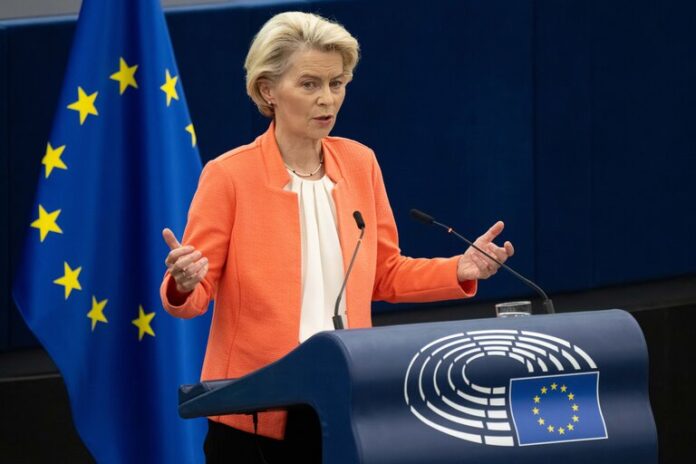On Wednesday 13th, Ursula von der Leyden presented her State of the Union address. It mixed strongly positive reminders of the achievements of her Commission in the face of past challenges, discussions about current challenges, and finished on a call to work towards enlargement to Ukraine, Moldova and the Western Balkans. Credit has to be given when it is due and there is certainly something good to say on how the EU was mostly able to preserve unity in front of the COVID and Ukraine crisis. But most commentators agree on the fact that the overall positive tone of the address was a bit tone deaf compared to the perception of the situation by European citizens faced with a cost of life crisis, geopolitical uncertainties, and the ever more obvious consequences of climate change. Leadership is about the ability to confront unpleasant truths and to present the trade-offs involved in any policy, not hide these under the rug.
On climate change, von der Leyden went all in on industrial policy and clean energies. Projecting unwavering confidence on the ability of Europe to find technological solutions to the decarbonization of industry – as long as its actors are protected from unfair competition -, she offered a vision of a possible green European policy. This is certainly welcome but this single mindedness left no place for mentioning any other aspects of the necessary transition. Nothing on circular economy, nothing on changing lifestyles and certainly nothing on questioning what kind of growth we might actually want.
A similar lack of ability (or desire?) to show leadership was obvious regarding agriculture and preservation of nature. Faced with the necessity to appease the EPP on the topic, von der Leyden expressed her conviction that both agriculture and preservation of natural habitats go hand in hand, threw some kind words to farmers and then proposed a “strategic dialogue” on the future of agriculture in the EU. It would have been interesting to know more about how she intends to support those who, in her own words, are already working towards a more sustainable agriculture.
It was a recurring theme in the address to use future dialogue to touch on difficult topics. We are promised dialogues on clean industrial transition, on agriculture, on social issues linked to the labour market, on AI. Only time will tell if this is more than a way to unload responsibility, especially in the time constraints facing the current Commission, with elections coming next year.
On migration, it seems that once again we will be able to have our cake and eat it too, as long as Member States do not derail the new pact on migration and asylum. Humane and compassionate policies will go hand in hand with the protection of borders. Agreements designed to limit migration will turn into vehicles of development and cooperation. It is a bit hard to swallow when so much focus is put on closing migration routes and so little attention is paid in the speech to human development. Beside a few words on emergency help, there was nothing to be found on aid. But human trafficking is once again singled out. Rightly so but it demonstrates some deliberate blindness on the root causes of migration.
Continuing with the theme of rounding the edges to the point of disbelief, it is telling that von der Leyden would not name Poland and Hungary when it comes to rule of law. It is certainly difficult to reconcile the Commission’s criticisms levelled at those countries in the 2023 report on the rule of law with the upbeat tone of the State of the Union.
Finally, the appeal to enlargement certainly strikes an emotional chord. The vision of a widely united, democratic Europe is more appealing than ever. But it is not without danger. Offering a very rosy view of the current situation of the Union, glossing over the real fracture lines at play, might create a shaky foundation for a healthy debate on enlargement. It will not be easy to reconcile von der Leyden grand vision and a merits-based approach to accession, without shortcuts.
As a reality check, the call of von der Leyden for Romania and Bulgaria to be finally accepted into the Schengen area, was immediately rebuked by Austria. This is more than 15 years after their integration into the EU. It does not signal much eagerness among current member states about adhesion talks, with governments anxious not to trigger public opinions wary of opening borders.
It is the political nature of such a speech to be optimistic. But it also hard not to agree with Janis Emmanouilidis, director of studies at EPC, when he laments that von der Leyden missed “an opportunity to trigger an honest and frank debate about trade-offs that will inevitably become increasingly more complex and difficult, given the fundamental transitions (green | digital | geopolitical | geo-economic | demographic) we are facing.”
To go further:
The text of the address can be found here.
A fairly in depth reaction from EPC here.
EEB very critical take on the ecology part of it here.


